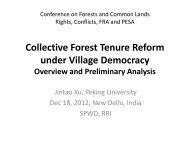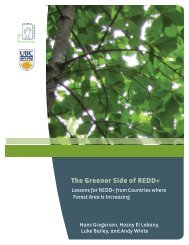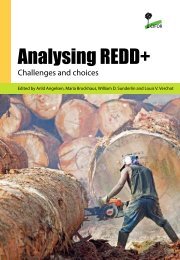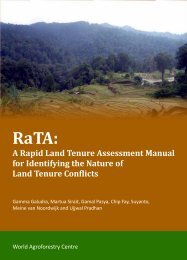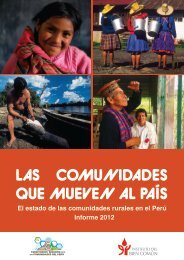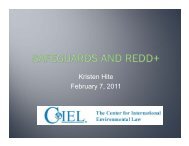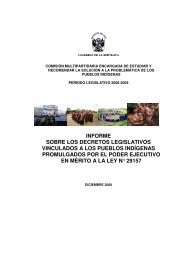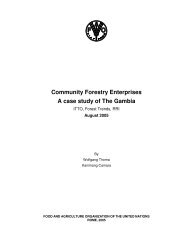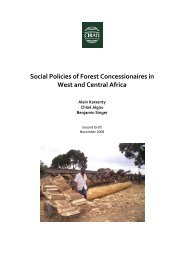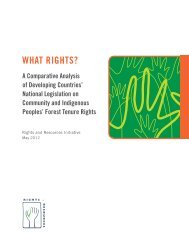An investigation into forest ownership and customary land ... - Fern
An investigation into forest ownership and customary land ... - Fern
An investigation into forest ownership and customary land ... - Fern
Create successful ePaper yourself
Turn your PDF publications into a flip-book with our unique Google optimized e-Paper software.
‘So who owns the <strong>forest</strong>’<br />
Recognising that most <strong>forest</strong> is owned by communities<br />
32<br />
The most important legal step, the most important legal step that has to be taken<br />
by the <strong>forest</strong>ry sector is to rid the new legislation of the dubious distinction of<br />
separating natural trees from the l<strong>and</strong> they grow on <strong>and</strong> allow the sector to begin<br />
working with l<strong>and</strong> owners (titled <strong>and</strong> untitled) not against them. Reconstruction<br />
of procedures to reflect the fact that the <strong>forest</strong> resource, not just <strong>forest</strong>l<strong>and</strong>, is<br />
already privately owned on a <strong>customary</strong> basis by communities follows, so giving<br />
clarity to the constitutional rights of <strong>forest</strong> owners. This includes respecting their<br />
right to decide if logging should or should not take place on their l<strong>and</strong>s <strong>and</strong> to be<br />
party to agreements from the outset. It includes enabling communities to enter<br />
<strong>into</strong> agreements themselves for the use of their <strong>forest</strong>s, under the regulatory eye<br />
of the authority. ‘Social contracts’ between loggers <strong>and</strong> communities designed to<br />
buy local cooperation will thereby give way to more mature contractual agreements<br />
in which communities themselves are the principal partners. The terms of<br />
these agreements, guided by regulation <strong>and</strong> the facilitation services of the FDA,<br />
will of necessity cover not just how the concessionaire <strong>and</strong> salvage contractees<br />
will operate, where <strong>and</strong> with what limitations <strong>and</strong> duties, but the mechanisms<br />
through which the ground rent <strong>and</strong> other shares of revenue will be delivered to<br />
the community resource owner. Income tax <strong>and</strong> other fees may be withheld at<br />
source.<br />
Related, natural resource legislation needs to provide for the designation of<br />
protected areas as a management classification of <strong>forest</strong>s, irrespective of their<br />
<strong>ownership</strong>. In the first instance this would remove the need to de-gazette eleven<br />
National Forests which were proclaimed as national property in 1960 without<br />
evidence that <strong>customary</strong> <strong>ownership</strong> (even as registered in fee simple Aborigines<br />
Deeds) was properly dealt with through compensation payments as constitutionally<br />
required. In the second instance, it would allow very large areas of<br />
<strong>forest</strong>s to be brought under formalised community protection. In this manner<br />
Communal Forests would become the major class of <strong>forest</strong> reserve <strong>and</strong> within<br />
which commercial or conservation developments take place. Current <strong>forest</strong> law<br />
(2006) relegates Community Forests to small <strong>forest</strong> patches adjacent to settlements.<br />
Providing clear <strong>and</strong> accessible forms for registering collective<br />
<strong>ownership</strong><br />
Within the property sector, restitution of the ‘right <strong>and</strong> title’ of <strong>customary</strong> owners<br />
to their respective collectively owned l<strong>and</strong> areas needs to be made explicit in<br />
law. This should be in terms which unambiguously recognises private property



